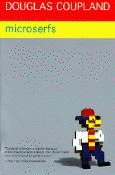
 A reporter's address book
A reporter's address book 
 Nick Bilton at the NY Times writes: "Lawyers I spoke with said that my address book-- which contains my reporting sources at companies and in government -- is protected under the First Amendment. On Path's servers, it is frightfully open for anyone to see and use."
Nick Bilton at the NY Times writes: "Lawyers I spoke with said that my address book-- which contains my reporting sources at companies and in government -- is protected under the First Amendment. On Path's servers, it is frightfully open for anyone to see and use."
It's a wonderful piece and the first time in memory that any news organization has made the Silicon Valley buddy-net the issue. There really is an adversarial relationship between today's technology suppliers and the users of the technology.
The mainstream press is breathless over the money, but look past that to what they're selling, and your adoration might turn to anger and fear. It's you and me that they're selling.
I'm glad that at least one reporter at the Times has the guts to go in there.
 Ebert is right
Ebert is right 
Roger Ebert writes on Twitter: "Each and every change to my Twitter page is a Bad Idea. Did they go berserk?"
I'll paraphrase in terms that software developers will understand. "It burns my braincells when you guys move stuff around for no good reason."
For example. I use a new version of a famous browser on one of my servers. No choice, because I deployed the server after the old version expired. They moved the Refresh icon. Seems like a little thing. Perhaps they user-tested it with web newbies and found it made more sense to them to separate it from all the other icons. But I don't think when I reach for Refresh. I don't have to. My brain commands the browser to "Refresh" and the base of my spine instructs my fingers to click the icon. The "howto" of this never reaches my intellect. Until they move the icon.
They're always moving stuff around in software like this. This is a lesson every generation of developers seems to have to re-learn. Little things like this break users. So what. Once you have competition and look into why people switch, you'll find that "it just works" or "it works like I think" is a highly valued non-feature. It's not something that you can put on a comparison chart. To users it's a subjective thing. It has to do with whether they like you or not. To you however, it's engineering. This feeling is created from hundreds of little subjectives they don't even see, that Ebert would totally understand. In film it's called suspension of disbelief. We don't yet have a name for this in software.
An analogy. I like driving cars with a steering wheel in front of me, a brake pedal on the floor and radio controls on the dashboard. Sounds silly when you put it like that. But computers aren't such new things anymore. Time for them to settle down and become the utilities they are. Tools for guys like Ebert to inform and entertain.
When Twitter moves things around gratuitously, true, Ebert has no choice but to continue to use Twitter, at least for now.





